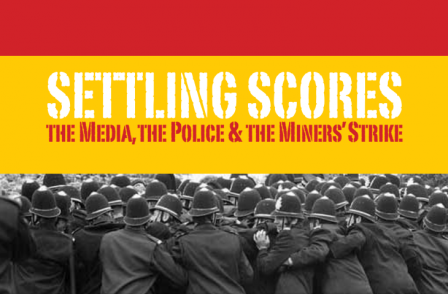
Misgivings about how BBC television news covered a key confrontation in the miners' strike were voiced internally almost as soon as a controversial news bulletin had been broadcast, newly released documents reveal.
Official minutes obtained under the Freedom of Information Act show that editor Peter Woon told a high-powered BBC News and Current Affairs meeting on 19 June 1984 that the previous day's teatime coverage of the Battle of Orgreave had displayed "a marginal imbalance", adding: "This was a general feeling in the newsroom."
Alan Protheroe, then assistant director general of the BBC, told the same meeting that "the BBC's early evening coverage of Orgreave might not have been wholly impartial".
The admissions are contained in documents released by the BBC in response to an FOI request and are revealed in a book to be published this month to mark the 30th anniversary of the 1984-85 miners' strike.
What became known as the Battle of Orgreave, on 18 June 1984, was widely seen as a pivotal moment in the year-long dispute over pit closures and job losses. Thousands of pickets hoped to hit steel production by closing the South Yorkshire coking plant but they were thwarted by similar numbers of police using riot squads, dogs and horses.
BBC television national news was subsequently accused by the National Union of Mineworkers (NUM), Labour politician Tony Benn and others of, in effect, screening events in the wrong order to create a misleading impression that mounted police charged pickets only after officers came under sustained violent attack.
Despite conceding there had been a lack of editorial balance on the bulletin in question, Peter Woon told the internal post-mortem: "It was exceedingly difficult to edit an hour's shooting. Any departure from balance, however, was not such as to justify the NUM’s view that the BBC was biased."
The following year, shortly after the strike ended, a confidential report into the BBC's journalism and the miners' strike was produced "for internal purposes… not for public consumption". Its contents have also now been made public following an FOI request.
When a draft of the report was discussed at a special News and Current Affairs meeting at Broadcasting House, London, on 30 April 1985, Alan Protheroe confessed he had felt "haunted" by the contrast between BBC news coverage of Orgreave and amateur footage presented in a later Open Space programme that told a very different story about police tactics on the day.
Editors pointed out to him that TV crews risked being attacked by strikers when they ventured too far behind picket lines, and that there was a "tendency of the police to behave well when cameras were present" – a restraint not always shown by miners and their supporters.
The 1985 internal report included the comment of one BBC local radio news editor who bemoaned "the apparent television hunger for violence on the picket line at the expense of greater understanding", while TV current affairs staff who covered the strike argued that when it came to gaining the trust of people in the coalfields, "no substitute existed for the making and fostering of direct face-to-face contacts".
Further details of the BBC's confidential discussions on its strike coverage are revealed in the book Settling Scores, edited by Granville Williams, which is being launched at Leeds Civic Hall on Thursday 13 March at 7pm.
Speakers at the launch will include Nick Jones, who covered the strike for BBC radio and is another of the book's contributors.
Tony Harcup's account of the BBC documents released under FOI can be found in ‘Reporting the next battle: lessons from Orgreave’, a chapter in Settling Scores: The Media, the Police and the Miners’ Strike, edited by Granville Williams and published this month by the Campaign for Press and Broadcasting Freedom.
Email pged@pressgazette.co.uk to point out mistakes, provide story tips or send in a letter for publication on our "Letters Page" blog
